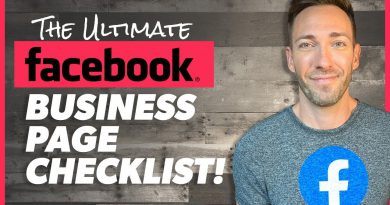On-page and technical SEO Part 2 – SEO Unlocked – Free SEO Course with Neil Patel
Today I’m going to walk you through the process I use for on-page and technical SEO optimization. This is one of the foundations of any successful SEO campaign, so whether you’re running an audit to pinpoint specific actions you need to take to improve your website or you’re going after more ambitious goals with your SEO campaigns, this is something you have to master.
RESOURCES & LINKS:
____________________________________________
Download the assets mentioned in this video: https://neilpatel.com/training/
SEO Unlocked Course Playlist: https://www.youtube.com/watch?v=Q_lySNxCag0&list=PLJR61fXkAx11Oi6EpqJ9Es4rVOIZhwlSG
Ubersuggest: https://neilpatel.com/ubersuggest/
Google Analytics: https://analytics.google.com/analytics/web/
____________________________________________
One thing that most people don’t think about when it comes to SEO is dwell time. And if you’re not sure what dwell time is, don’t worry about that.
Its Session duration, you know, is someone staying on your website for a long time.
Bounce rate. Are they just bouncing off and going to a different website or going back to Google or somewhere around the web because they’re not happy with what they’re seeing?
And click-through rate. A click-through rate is when someone’s doing a Google search, they find a keyword, are they clicking on your listing more than the competitors?
Because if they’re clicking on your listing more, it tells Google that hey, you’re more relevant.
But there’s things that you can do to keep them there as long as possible. The main way is to measure and check to see if your customers are happy. And even your visitors.
The way you do this is you go to Google Analytics, and you sign up. If you’re not sure how, you can always email your developer or you can ask my team and we’ll tell you feedback on how to do this.
Once you add it to your website, you can view it in your source code. And then over time, not right away. And you’ll start seeing it for future dates. So if you put on the code today, you’re not going to see your traffic stats and your data from a month ago, but you’ll see it from today onward.
And what’s cool about Google Analytics is it can show you session duration, this is how long people are going to be on your website, and then navigation, go to audience.
Then click on behavior, and then click on engagement. And you’ll get data all the way from time on site, page use per session, bounce rate, these are all very important metrics. What you ideally want to shoot for is people staying on your site for at least two minutes.
And I’ll show you how to do that over time.
The first thing you want to do is within the navigation of Google Analytics, go to behavior, then site content, and then exit pages. This will show you all the pages that are causing people to leave your website.
Put yourself in the visitors shoes or the customer shoes. That way I can keep them on my website and keep educating and helping them out and provide a better user experience.
You also want to look at your site speed. The slower your site loads, the worse your bounce rates going to get. So go to Ubersuggest. And in Ubersuggest, go to the site audit report in the left hand navigation, once you load up Ubersuggest.
And then I want you to click on site audit, in there, not only does this report show you all the errors you’ll have when it comes to SEO.
As you get more traffic, you get more age, you’ve been around on the web longer, your bounce rate should decrease.
Another way to make your metrics better is to improve your click-through rate. So you want to use appealing text. So for your title, I broke down in the previous lesson on how to create amazing titles, follow that. In your meta description. Make sure you include keywords. And you can use a site audit report in Ubersuggest to make sure you’re avoid using long meta descriptions or long title tags, or duplicate descriptions or duplicate title tags.
By following all of that, you’ll end up doing better and getting more clicks, which will improve your rankings.
So you want to make sure that your site is mobile compatible, you can do this through a responsive design, and that helps quite a bit.
Page speed is super important with mobile because these mobile devices even if they’re on 5G or LTE, it doesn’t mean they’re going to get that connection everywhere.
Site structure is very important too, this will help with click-through rate. If you have a lot of pages on your site in your interlinking right. Over time, when someone searches for your brand, you’re going to see an indentation. These are site links.
► If you need help growing your business check out my ad agency Neil Patel Digital @ https://neilpateldigital.com/
►Subscribe: https://goo.gl/ScRTwc to learn more secret SEO tips.
►Find me on Facebook: https://www.facebook.com/neilkpatel/
►On Instagram: https://instagram.com/neilpatel/
#SEO #NeilPatel #DigitalMarketing





